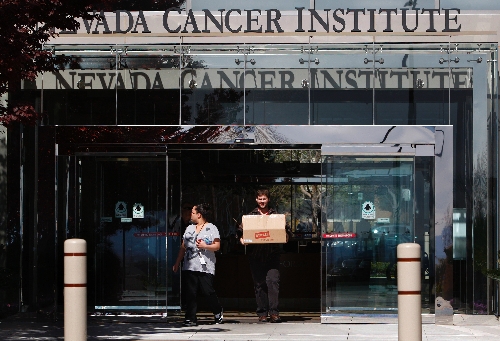Officials plan to close Nevada Cancer Institute
In an about-face from its strategy laid out early this year, the University of California, San Diego has decided to shut down its Nevada Cancer Institute by the end of the year. Meeting with employees on Nov. 5, cancer institute CEO Mickey Goldman revealed that their last day, except for a few needed to wind up operations, will be Dec. 31. Those who remain until then would receive a three-month bonus, he added.
Comprehensive Cancer Centers of Nevada is expected to acquire some pieces of the medical practice as well as leasing a part of the institute's building in Summerlin, but specifics were not spelled out except for a probable reopening date in early February. Institute employees would have to apply for jobs from Comprehensive Cancer with no guarantees.
When UCSD purchased the then-independent institute out of Chapter 11 bankruptcy in January, "We came in and pretty much hired everybody where they were," said Goldman. "We don't know what (Comprehensive Cancer's) plans are."
Comprehensive Cancer spokeswoman Lisa Sanford said discussions were continuing between the two sides, with nothing firmly settled. In October, a statement said Comprehensive Cancer would lease 42,000 square feet in the institute's 142,000-square-foot building and collaborate on bringing clinical studies to Las Vegas "if negotiations are successful."
Early this year, the institute's payroll included 135 people not involved with research with an updated number not available.
UCSD declined to comment.
Goldman, according to a recording obtained by the Review-Journal, said efforts had begun to ensure the patient care would not be disrupted during the transition. Accepting new patients halted last week, although employees raised concerns about the fates of those on Medicare, now in the midst of the enrollment for supplemental insurance plans, Medicaid or those with no insurance. The institute has seen about 3,000 patients a year on average.
Brian Brannman, CEO of University Medical Center of Southern Nevada, said physicians had already been lined up to assume care for patients, many uninsured or with Medicaid, that had been seen in a joint venture between the hospital and the institute. "We saw this coming and didn't wait to see what would happen to us," Brannman said. "Patient care will continue without skipping a beat."
In talking to the institute employees, Goldman said, "I know this is hard. I know this will create challenges. ... (Patients) will not experience anything other than the exceptional care they have come to know, appreciate and value from this organization. If you cannot do that, if you cannot deliver that, I invite you to leave now."
The institute was founded a decade ago as an attempt to attract both research and higher quality care to the Las Vegas area. But it buckled last year after amassing nearly $100 million in debt without the revenue to repay it, resorting to bankruptcy to sell the flagship clinic building and the medical practice.
USCD emerged as the only bidder after more than a year of canvassing interest across the country, agreeing to pay $18 million but only after receiving promises that it would receive $20.8 million in donations over a five-year period from the Nevada Cancer Institute Foundation, the fundraising arm. Goldman, an oncology management consultant based in Rancho Mirage, Calif., was tapped as the new CEO.
Initially, he said, UCSD planned to take three years to reach the break-even point or better after several years of losses and invested an undisclosed amount in building the medical practice. But a change of leadership at the UCSD health system, concerns raised by the administration of the University of California system, cost overruns at a major project in San Diego and a change in California tax rules that cost UCSD more than $10 million combined to cause a change in direction.
Further, said Goldman, running a free-standing institute is difficult "in today's environment, with reimbursement going down, the cost of drugs going up and a very competitive marketplace."
A proposal to expand ties with UMC ran aground because its approval process, including votes by the Clark County Board of Commissioners, would have taken at least a year, he said. This was too long for UCSD.
Brannman, however, said the proposal included additional spending by UMC, money it does not have and might not produce a good return.
Ties to Comprehensive Cancer are still in the works, including assuming the role of landlord and working together in some areas. "It's not done yet, but pretty darn close," Goldman said in the recording.
With rumors swirling about the institute's fate, Goldman said in the recording he traveled to San Diego on Nov. 2 to receive a firm answer.
Contact reporter Tim O'Reiley at toreiley@reviewjournal.com or 702-387-5290.

















